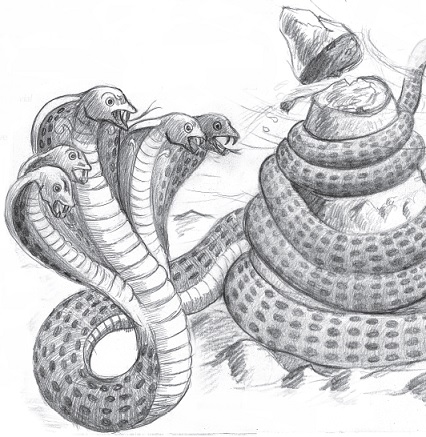Pride and vanity are catalysts for arrogance.
Greater the pride, greater the insecurity.
Two gandharvas were once debating who was stronger — the gigantic celestial serpent Vasuki or the wind god Vayu. The gandharva supporting Vasuki substantiated his claim by saying that Lord Vishnu personally chooses Vasuki to carry out herculean tasks such as churning the milk ocean or rescuing the beings of the universe from the deluge when the Lord appeared as Matsya, the fish incarnation. The other gandharva wondered if Vayu was stronger.
Vayu was naturally slighted by the comparison. His ego yearned for a duel to prove his superiority. The mind is expert in converting trivial puddles into oceans.
Vasuki, when challenged to prove his superiority, responded enthusiastically. Their gandharva sycophants pumped each of them up. Deep insecurity stems from the fear of being overshadowed. Such people may surround themselves with sycophants.

The duel between the two involved Mount Meru. Vasuki would coil around it thrice, while Vayu had to blow hard and attempt to yank it out of Vasuki’s grip. They didn’t care to seek Mount Meru’s permission to be used as the object to prove their individual strengths; both lacked the foresight to estimate his pain.
The natural outcome of disagreement is insensitivity to one’s surroundings.
Oblivious to Mount Meru’s predicament, Vasuki and Vayu began their duel. The harder Vayu blew, the tighter Vasuki coiled around Meru. Neither paid heed to Meru’s plight. In the tussle between the two powers, Meru suffered the most. Both powers forgot that with great power comes great responsibility.
Compare this situation to the northern Indian state of Jammu & Kashmir, caught helplessly between the vortex of India and Pakistan. Kashmir has become the symbol of national ego, of proving ownership, of oneupmanship. But do the leaders of either nation deem it important to protect the best interests of Kashmiris?
When neither Vasuki nor Vayu wished to back down, be the first to blink, Meru begged Lord Brahma to intervene. In the clash of the titans, a neutral decisionmaker was needed. Sometimes, a third perspective is needed to make a clear judgment, especially when passions threaten to clash. Lord Brahma instilled better sense into both gandharvas, making them understand their individual strengths. The creator Brahma was needed to tell them that each entity is created for a certain destiny. He convinced them that the purpose of their strengths was to co-operate than to compete, to be complementary rather conflicting.

Rather than being engaged in one-upmanship, one should focus on how combined strength can enhance individual capabilities.
India would benefit infinitely if the ruling and opposition parties agree on betterment of the country. Instead, the two parties focus on fault-finding and finger-pointing. Their formation is intended to keep a check on wrong governing decision and to reverse incorrect decisions, all for the sake of its citizens.
Acknowledging their mistake, both Vayu and Vasuki put an end to the competition. As Vasuki eased his grip on Mount Meru, a huge piece of rock broke off and fell into the ocean. This enormous rock had three peaks, hence the name Tri-kuta. It was this rock — which later became Lanka — that Visvakarma chose as the paradise island for the recreation of demigods.
The rock that fell off was the result of envy between two personalities. Is that the reason why Lanka is always associated with envy?
The subtle consciousness with which something is created dominates the creation.
This amusing tale of Meru’s plight throws up dazzling lessons. The pointers from these passages underline the important lessons:
1. Personal ego can be a fertile ground for destructive arrogance.
2. The natural outcome of disagreement is insensitivity to one’s surroundings.
3. A third perspective is needed to arrive at a proper judgment, especially when passions threaten to clash. Right counsel aids in taking the right decision at the right time.
4. Betterment of a situation by combining individual strengths should be the focus of attention, not satisfaction of individual egos.
Subha Vilasa Dasa is a motivational speaker and a spiritual lifestyle coach. He is also the author of the six-volume series Ramayana – The Game of Life (Book 1), points from which have been used in this article. He conducts corporate training programs on relationship management and work-life balance for leading corporations like Aditya Birla, HUL, Edelweiss, IOCL, MTNL, and several others. His email: ramayana.shubhavilas@gmail.com
